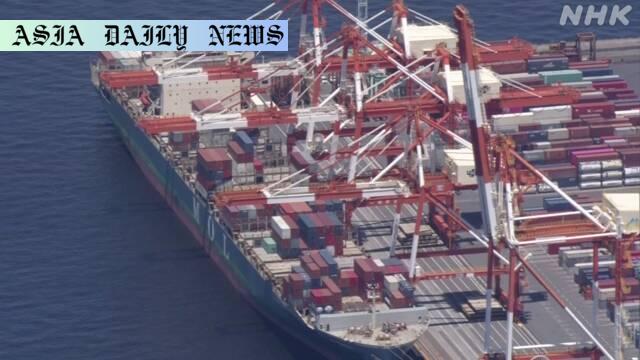US tariffs are sparking concerns in Japan as firms like Mitsubishi and Mitsui report significant profit declines due to falling resource prices.
- US tariffs lead to significant profit decreases for major Japanese firms like Mitsubishi and Mitsui.
- Falling resource prices and slowing global trade pose significant concerns for profits in fiscal 2025.
- Shipping giant Mitsui O.S.K. sees a risk from reduced global goods flow, especially US-China container traffic.

Overview of US Tariffs and Their Impact on Japanese Firms
The imposition of additional US tariffs under the Trump administration has sent ripples across global economies, particularly affecting prominent Japanese corporations. Concerns related to global goods flow, falling resource prices, and trade conflicts between the US and China are creating an atmosphere of economic uncertainty. Key players such as Mitsubishi Corporation, Mitsui & Co., and Mitsui O.S.K. Lines are bracing for significant profit losses in fiscal 2025, an alarming trend for both Japan and its global business networks.
Mitsubishi and Mitsui Brace for Decline in Profits
Mitsubishi Corporation, a leader among Japanese trading companies, has projected a 26.4% decline in net profits for the business year ending March 2026. This steep drop is attributed to declining natural resource prices, particularly crude oil, iron ore, and coal, all of which have been impacted by the global economic slowdown triggered by US tariffs. Similarly, Mitsui & Co., another prominent trading firm, anticipates a 14.5% drop in profits. The fall in resource prices has raised questions about the sustainability of their business models under these new challenges.
The Role of Resource Prices and Global Trade Conflict
Resource-based industries form the backbone of these firms’ operations. However, growing tensions between the US and China, alongside a weakened global economic outlook, have caused significant dips in market prices for resources such as crude oil and coal. Furthermore, China’s slowing economy—partially due to its trade conflict with the US—has exacerbated pressure on these resource prices, making the environment even more strenuous.
Mitsui O.S.K. Lines: Shipping Sector Hit Hard
Mitsui O.S.K. Lines, a major player in the global shipping industry, projects a 60% drop in net profits for fiscal 2025. The impact of US tariff measures has been especially apparent in the shipping sector, where container transport of goods from China to the US has declined. The company also sees lower demand for car carrier shipments, further intensifying its financial woes. To cope with these challenges, Mitsui O.S.K. plans to establish a Washington office in June to monitor changes in US policy and revise vessel operations to align with evolving market conditions.
Strategies and Long-term Implications
Despite the alarming forecast, Japanese firms are cautiously developing strategies to manage these challenges. Mitsubishi Corporation’s President and CEO, Nakanishi Katsuya, highlights the importance of monitoring macroeconomic factors to navigate through this period of uncertainty. Similarly, Mitsui O.S.K.’s decision to set up a Washington office reflects an adaptive approach to staying informed about policy changes. However, these efforts emphasize the need for a diversified and transformative approach beyond mitigating short-term risks. Firms must invest in market diversification, technological transformation, and operational efficiency to weather this uncertain era.
Conclusion
The current scenario underscores the interconnectedness of global markets and the cascading effects of policy decisions in one nation on others. The uncertainty brought on by US tariffs exemplifies how protectionist measures can create ripples across supply chains, reduce profitability, and force companies to re-evaluate their operational strategies. Moving forward, collaborative trade policies and efficient diversification will play key roles in stabilizing global markets and ensuring resilience.



Commentary
The Far-reaching Impact of US Tariffs
It’s fascinating—and somewhat disheartening—to observe how a policy in one country can act as a domino, impacting economies worldwide. The US tariffs, particularly during the Trump administration, have highlighted the intricate web of global trade. As seen in the case of Japanese firms such as Mitsubishi, Mitsui, and Mitsui O.S.K., these policies are not isolated events; they shape industries, profits, and relationships across nations.
Japan: The Collateral Damage of Trade Wars
Japan’s reliance on global trade, especially in natural resources and shipping, makes it particularly vulnerable to the shifts caused by US trade policies. While Mitsubishi and Mitsui are pillars of Japan’s economy, they are not immune to external forces. The slump in profits due to faltering resource prices is a reflection of how interconnected economies struggle when one gear—like US policy—shifts unexpectedly. These developments should serve as a caution for policymakers worldwide about adopting protectionist stances.
The Future of Trade and Japan’s Response
Despite the doom and gloom, it’s encouraging to see Japanese firms taking proactive measures, such as Mitsui O.S.K.’s plan to open a Washington office. Staying ahead in this volatile global environment requires businesses to pivot strategically. However, protectionism and trade wars should prompt broader discussions on global economic policies. Free trade and collaboration must re-emerge as the priorities to ensure stability and growth. This situation calls for global leaders to address not just trade conflicts, but also the systemic risks they pose to all economies—not just the ones directly involved.